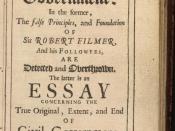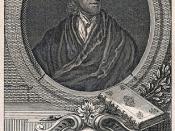John Locke was a 17th century philosopher who defended the Europeans' colonization and appropriation of American lands through his discourse on property rights. However, this defense was not adequate for a variety of reasons: because the Europeans took far more than they should have, because the labor sometimes performed by the Europeans to claim property is contradicted by other claims that Locke makes throughout his Two Treatises, and because he overlooks the idea that the natives may not have understood the purpose of money.
One of Locke's main ideas in his theory of property is that one can take as much as one needs from the earth, so long as "there [is] still enough, and as good left; and more than the yet unprovided [can] use." (pg 291) Locke implies that one should not take more than land than is necessarily needed or reasonable. In the 17th century, the only recently-discovered Americas were certainly large and there was a vast amount of uninhabited land that the Europeans were able to settle.
With the exception of portions of land that was entirely uninhabitable, this land was, over time, generally claimed by many different Europeans that came to settle it. This taking of land that was unused and lying free is certainly acceptable, and completely defensible by Locke's theory of property. However, there were plenty of cases in which Europeans took much more than their fair share. In some cases (for example, the French colonization of Canada, or the Spanish colonization of Latin America), Europeans even took lives in their attempts to subdue the native inhabitants and take their land. Some of those inhabitants were killed outright, while others were enslaved. The Europeans in these cases not only took more land than they should have (because it was already claimed), but they also went as far as claiming people as property. Locke clearly says in other parts of the Two Treatises that "the Natural Liberty of Man is to be free from any Superior Power on Earth, and not to be under the Will or Legislative Authority of Man." (pg 283) It can be said, then, that the Europeans' actions in such cases cannot be defended by Locke's theories.
Of course, another of Locke's basic ideas in his theory of property is that for a person acquiring property, "the Labour of his Body, and the Work of his Hands, we may say, are properly his." (pg 271) Therefore, if one performs an act of labor, then that which they have performed the labor on is rightly theirs. This idea may in turn support the Europeans' killing of some native inhabitants of the Americas - they performed the labor required of them to claim that land as their property. However, again, Locke's theory of property cannot be taken out of context of the rest of his Two Treatises. Locke clearly says that "no one ought to harm another in his Life, Health, Liberty, or Possessions." (pg 274) He further says that "who so sheddeth Man's Blood, by Man shall his Blood be shed," (pg 271) probably talking about a government's responsibility to "preserve the innocent and restrain offenders." (pg 279) Yet, the Europeans often committed completely unjust acts of violence and slaughter, without receiving any check on or punishment for their actions. It is clear, therefore, that Locke's theory of property cannot provide an adequate defense of every instance of European colonization in the Americas, especially cases where Europeans labored in such a way that claimed lives along with property - otherwise, it would be contradictory to his other theories. In accordance with Locke's theory, the native inhabitants had already performed the labor to own their property anyway (by building housing, or planting crops, or any number of other things). So, in essence, the Europeans who came to colonize those lands were thieves, and Locke says that it is "Lawful for a Man to kill a Thief" (pg 279) - meaning that the colonizers themselves should have been killed for trying to take the land that belonged to the natives.
Another of Locke's points in his theory on property is that the creation of money allows people to own possessions that are larger than what is necessary, because money is "some lasting thing that Men might keep without spoiling, and that by mutual consent Men would take in exchange for the truly useful, but perishable Supports of Life." (pg 300) It is true that in some cases of colonization, Europeans offered to pay the natives for land and other "supports of life" with their money. However, in many such cases, the natives did not accept the money for their land, mainly because they did not understand what it was for. This often led to some disagreements between natives and Europeans, to the point of violence. However, Locke cannot entirely defend these actions, because he does make a point of saying that the exchange of money for some other object is "by mutual consent." Locke even says that in the Americas, "no such thing as Money was any where known." (pg 301) The natives, therefore, could not have given their consent.
Locke argues that because of this inability to give consent, the natives had therefore "not joyned with the rest of Mankind." (pg 299) He says that because of this, their lands in a sense "lie waste" and so "still lie in common" - something that can never happen "amongst that part of Mankind, that have consented to the Use of Money." (pg 299) With this, he attempts to justify the European taking of land from the natives who did not use money. However, this contradicts his very idea of consent, and also the afore-mentioned idea that "no one ought to harm another in his Life, Health, Liberty, or Possessions." Also, even if the natives had known enough of money to be able to give consent, they may still not have wanted to sell their lands. So, the actions of the Europeans can still be considered thievery.
In conclusion, it can be said that Locke's theories of property work well merely as that - theory. They cannot be an adequate defense of the imperfect colonizer's of the Americas to which Locke tried to apply them - because those colonizers often contradicted his theories by taking more than they should have, by murdering people as their form of labor to gain property, and by attempting to take away the ability of people to consent to something because of their lack of knowledge of money. Had the Europeans followed Locke's guidelines more exactly, his theories would certainly have defended them. However, history has shown otherwise.
Locke, John. Two Treatises of Government. Cambridge University Press. New York, NY. 1960.





